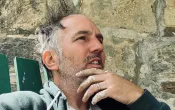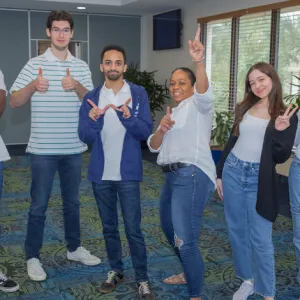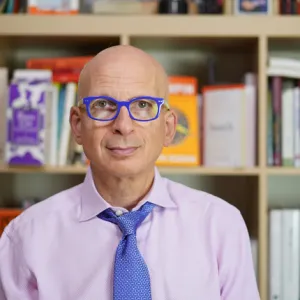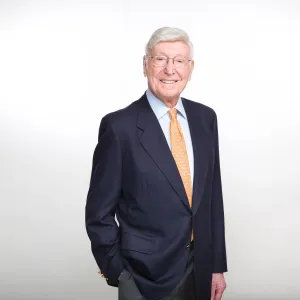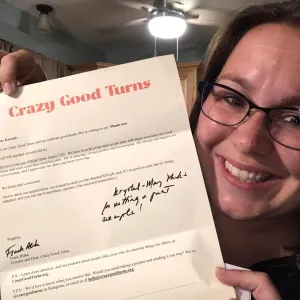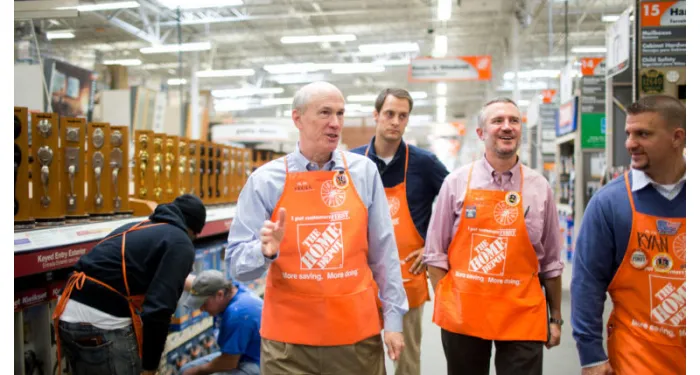
Frank Blake
Reflections on Gratitude, Known and Unknown
Frank Blake looks back on a leadership lesson and discovers a new meaning. How can you show gratitude when you don’t know who to thank?
I realized recently how badly I'd missed the plot line of a story I've told dozens of times.
The story is about an anonymous note I received from Andy Stanley, pastor of the church I attend in Atlanta, during my time at The Home Depot.
The note described what happened to a man who shopped at a Home Depot store in North Georgia. The man had a cartload of lumber, and while checking out, the cashier asked him: "What project are you working on, and did you find everything you need?"
The man said that he was building a coffin for his grandson, who'd recently died.
The cashier immediately replied: "Please, sir, don't even think of paying," and waved him through the line.
The First Lesson
I discuss this interaction often when talking about leadership. It's an example of how a story is so much more compelling than general phrases when setting a direction for an organization.
It's easy to say, "Customer service is important." But until you provide examples of what "customer service" means, the words are empty.
We get what we celebrate and recognize. When celebrating a story, the more compelling and memorable it is, the better. The story from this cashier is certainly both of those things, and so I've told it often.
But until now, I'd missed the plot line.
A Deeper Meaning, Upon Reflection
The November episode is unique in that there is no guest. Instead, I answer some of the questions we most often receive about the show. And from doing the show alone, I learned something.
One of the questions is whether I have a favorite story from Crazy Good Turns. And while that's a bit like choosing your favorite child, I do have a nudge winner from Season Two.
It's about a trucker who pulled over to save a little girl's life. He left no note and never asked to be thanked. He simply did the right thing and drove on. You'll hear it around 17:14.
The heart of that story is about doing good and helping someone else when no one is looking. Doing the right thing even if no one will know, and no thanks will be given.
As I recorded this episode, I realized: I still don't know who that cashier in North Georgia is. I did not thank her. She just did the right thing when no one was looking.
That is the plot line.
Our Challenge
This podcast recognizes and celebrates great things people do for others. We've done it for six years now, and brought a lot of great stories to light. But as much as we express recognition and thanks for deeds known, those are overwhelmed in number by good deeds unknown and unthanked.
I now look at that North Georgia story as an example of the debt I owe to unknown kindnesses of all sorts through all my life.
This is, for me, is the meaning of the quote I use in the podcast from David Whyte's book Consolations, which says:
Gratitude "shows we understand and are equal to the gifted nature of life."
Stories of the trucker and the cashier are reminders of the gifted nature of life, and the challenge of being equal to the gratitude we owe.
First up, I admit Crazy Good Turns is not an obvious title for the podcast.
For people who don't listen to the podcast, the first question I always get is, well, what is it about? What's this podcast about? That's probably a sign we flunked marketing 101 if people don't understand what the podcast is about from its title.
Our website gives some background to how we came to the title. I started this effort with Brad Shaw, a colleague from Home Depot. Brad was a Boy Scout as a youth, and he talked at the Boy Scout's oath about doing good turns, doing for others.
I come from New England and there's a phrase in New England, particularly the part of New England I'm from, that uses the adjective wicked for something that's good. It's very much of an attribute, so someone's wicked smart, or that tastes wicked good or something like that. So it's a positive phrase, wicked.
My first reaction was we should call this Wicked Good Turns, but that would really get people lost on what the meaning of the podcast was. And so we tried to find a word that was kind of close to wicked in energy and edge, but not quite as problematic as wicked, and we came up with Crazy Good Turns. You know, things are crazy good. Crazy Good Turns.
And that also made sense as a title, because if you go back and you listen to the first two seasons of this podcast, we invested quite a lot in coming up with new music. We wanted to give our audience members some access to new and upcoming artists. So turns also reflected back on the olden times of turntables and spinning records, and so Crazy Good Turns had kind of a double sense.
But in any event, for those who don't listen to the podcast, sometimes it can be a little opaque what we're about. For those of you who do listen to the podcast, and obviously you're the ones I'm talking to, the most frequent question from listeners is what counts as a crazy good turn. How good does a good deed have to be to qualify as a crazy good turn? How crazy?
Again, if you go into our website that unfortunately hasn't been changed in a long time, you can see in the bowels of the website, we actually try to answer that question. But now, several years later, as I reflect on it, my answer is on Crazy Good Turns we're interested in any act of kindness. Over the course of the last several years we've had guests who've engaged in acts of truly extraordinary generosity. People who've put their own lives at risk, people who've traveled to remote and difficult parts of the world, who have addressed some of the most difficult and troubling needs of others. They're amazing stories of amazing people. But we've also had guests whose acts of kindness are far smaller in scope, don't involve personal risk, and may not have an impact beyond their communities or sometimes even their families. I think that's entirely appropriate.
There's a great quote, "A small act, a small act is worth a million thoughts." And that's the core of it. We want to celebrate and recognize those who take the step to translate the thought into an act. And I'm prompted on this because I'm going to give you my own small example of an act that made an enormous difference to me yesterday, and that is in my mind a crazy good turn. And so let me tell you roughly what happened yesterday. I was in the airport waiting for a flight, and a woman comes up to me and hands me a note. And the note says simply, thank you for all that I did for the associates at the Home Depot. And it says, "I know that you used to write notes to associates. Here is one for you. All the best." And it was signed Kelli And I found out later, last name is Quinn. So Kelli Quinn hands me this very simple note, thanking me in effect for the many notes I wrote while I was at Home Depot.
And as background, I had a habit every Sunday afternoon, I would sit down and I'd write out about 200 handwritten notes every weekend to associates at Home Depot, thanking them for their great customer service. We'd have examples of great customer service, and I'd write these handwritten notes to our associates. It was hugely important to me as a way to connect with what was happening every day in the company, and as a way to celebrate and recognize our associates. And it made an enormous difference to me yesterday to get this note now, many years after I've left Home Depot, from an associate at Home Depot saying just thank you, which is what I was doing as I was writing my notes.
And I think in my ranking of crazy good turns, the effort was not enormous. It's a small act to write a little handwritten thank you note, but what an enormous impact it had. It had a big impact on me just saying, "Oh those stones thrown into ponds years and years ago, there are still ripples from that," and an enormous appreciation for the woman, Kelli Quinn, so this is my public thank you to Kelli Quinn, for someone who had a thought, oh, gee, I see there's Frank. Some thought passes her head. Gee, that was an awfully nice thing he did, writing notes. But then to take the time to translate that thought into an act and to express it to me. I count that as a crazy good turn. It's going to stick in my mind for a long, long time. And so thank you, Kelli Quinn. And that to me is sort of one of the definitions of crazy good turns.
I'll also say, this is just a side note for those of you not familiar with some of the things I've said about Home Depot and some of the things I've learned about Home Depot. The note-writing to me was really a foundational element of how I approached my job. And there's a lot of talk now in companies about purpose and what's the purpose of a corporation and all its stakeholders. And you have companies with very grand purposes in terms of whether it's the environment or social justice or whatever. I will just say for myself, the starting point for me was always… The first purpose of leadership in an organization is to care about the people who work there and to express your appreciation to them when they do great things.
And this was brought home to me very, very early on in my time at Depot. In fact, it was my first year. And I got a note from Andy Stanley, who some of the listeners may be aware of. He's a pastor here in the Atlanta area, has one of the biggest churches in the country. And Andy wrote me a note, and he said that he received a note in turn from a parishioner of his who described the following at a Home Depot store. And he said this person said, "I was checking out at a Home Depot. And I had my cart full of lumber, and the cashier asked me," and parenthetically, this was exactly what we always asked cashiers to do, "'Did you find everything? What project are you working on?' The cashier asked me that." And the man said, "This lumber is for building a coffin for my grandchild." And the cashier said, "Sir, don't even think about paying. Please proceed."
And that note gave me chills and made me realize that the associates at Home Depot do such extraordinary things for customers every day that go unheralded. And that's true probably for most retail establishments, most service establishments. I realized that one of the first things I had to do was to say thank you to the people who would do that and realize, again, talk about acts that have ripples through an organization, that act had an immense impact on me and it continued to have reverberations through the company for at least the eight years that I was there as the CEO. So writing notes is an important thing. Highlighting great actions is an important thing. And that is my answer to how crazy does a good turn have to be. It doesn't have to be that crazy. What it has to be is the expression of a thought of gratitude into an act expressing that gratitude.
And I'll end this long-winded answer to the question by saying one of my most favorite things we've done in the last few years on Crazy Good Turns is we did the $50 recognition program during the pandemic, and gave away a little over $25,000 in $50 recognition cards. And the way the program worked is you just had to write in to Crazy Good Turns, "I want to say thank you to… Here's the person I want to say thank you to." And we'd send a $50 gift card to that person and a note of appreciation expressing what you had said the person had done to merit the thank you. The stories we got around that, one of my regrets is that we haven't displayed for all of our listeners the amazing stories we got, and I am determined that we're going to do another $50 recognition program in 2022.
I hope it's twice as big as the program we did during the pandemic. And I hope we're going to learn our lesson and reveal to all of you, just these common acts of kindness and courtesy that happen every day. And then the effort that others are making to take the time to write down what that common act of kindness or courtesy was and recognize it with the $50 gift program. So I'm very excited about that for next year. It very much is in my mind, right at the center of what Crazy Good Turns is about. So - doesn't need to be a world changing act of kindness to be crazy, it just needs to be that effort to take something out of your head and turn it into an act of kindness.
So, the second question that I most frequently get from listeners is what's my favorite episode. And that is, of course, like asking a parent who is your favorite child. There's really no answer to that. I look at just this year, and I am honestly thrilled at the people we've had as guests. David Perell, who is a great writer and thinker, and we were very privileged to sponsor scholarships to his Write of Passage course, teaching folks how to write and how to express themselves, particularly on the internet. Sean Doherty, who has just a phenomenal story on addressing childhood diabetes. Karl Zinsmeister. I mean, I could go through each one of these. Karl is one of the most thoughtful people on the nature of gratitude and how philanthropy works in the United States and how important philanthropy is to our national character. Just a fascinating person.
Tyler Cowen, probably one of the most… Not probably, strike it. Easily the smartest person we've ever had on Crazy Good Turns. I think he's nationally or internationally recognized as one of the hundred smartest people in the world. Just such an interesting person with so many great insights. Dana Gioia, a poet of renown. I mean, it was phenomenal to have Dana on the show talking about his terrific book about studying with Elizabeth Bishop and other stories. Quincy Larson, Morgan Housel. I mean really, as I say, just looking… I mean, Chelsea Mandello with Troopster. We had some phenomenal guests. And I have left some out, but really pleased, not only this year, but every year with the quality of our guests. If you asked me for each one, I could say why they were a guest and why that was so exciting and why I think they so exemplified Crazy Good Turns.
But in the spirit of a direct answer to the question, I do have actually one that sort of is a nudge favorite. The show is from Season 2, and it starts like this:
JANIS MARTINEZ: "I'm going to tell you a story how it was told to me."
FRANK: That's the voice of Janis Martinez. She's a retired executive living in the Atlanta area. And the story she shared with us in our episode "The Gift" begins in a small home in Texas.
JANIS MARTINEZ: "It's in a home with three little girls, and a mom and a dad, and they're very, very poor. The mom had to go to the grocery store so she asked the neighbor to come over and take care of the girls. Well one, the little 2-year-old, was down on the sofa because she had a really bad cold, and the mom didn't want the other two to get it, so she had them be upstairs.
Well the 2-year-old was covered in Vick's sitting on the sofa. The mom goes to the grocery store, the next door neighbor goes back home to check on her baking, the grocery store was literally right across the street. While the woman was gone, the little girl reached down in the sofa cushions and found a box of matches. And she lit the matches. And she went up in flames as if somebody had poured kerosene onto her.
Her older sister upstairs, Linda, heard her screaming and came down, pulled her off the sofa, and to the front screen door. The mom had come back from the grocery store and was talking to a delivery man out front. She looked over and saw the little girl. She had her hands up in the air and she thought she was holding two orange balls, and realized she was on fire. So the mother ran in.
The delivery man kept screaming, "Wrap her in a rug! wrap her in a rug!" so they rolled her up in a rug and the delivery man and the mom went to the hospital. And because they had no money, they went to the charity hospital.
So the mom came into the hospital and into the emergency area, and they took the baby from her and they treated the mother's hands because the mother had second-degree burns on her hands. And after she was treated the mom went out to try to look for her little girl so she went up to the pediatric floor. People were rushing in and out of this room with blood and buckets of ice and she thought, "Oh my gosh, that baby must be dying."
So she goes down to the nurse's station and she asks for her daughter and the nurse puts her arm around her and walks her down to the room where indeed this baby was definitely dying. She was running 105-106 fever constantly. The doctors said that if she lives, she will be brain damaged, she'll never have children.
When you are burned, your body quits making red blood cells. Red blood cells carry the oxygen to your organs, so hear a lot of times when people are burned that they died of organ failure, and that's why. This baby need a lot of blood transfusions, and they ran out of B+ blood.
So the call went out in Richmond, Virginia, the call went out for blood. And a truck driver from New Jersey was coming through town and he heard the call. He stopped, and he not only gave blood, but he donated skin. And this is a dreadful process, very, very painful. So this man really was a major donor here.
The mother when she'd come to visit, they had always, she had to wait in the waiting room because the baby had a sterile room, and she had to wait in the waiting room until they were ready for her to come in. And she noticed over to the side there was this little room that when the parents would go in there, they always came out crying. And so the mom referred to that as the "death room." So about 45 days after the incident had happened, the mother was sitting in the waiting room and the nurse asked her to go into that little room.
Through this whole process, the mother kept fighting God. "You cannot have her, you can't have her, she's mine and you can't have her." So she goes into the room and there's this little table sitting there, a chair there, two chairs here. She sits down and she puts her hands down on the table and puts her head on the table and says, "God, if you really need her, you can have her."
And at that point the doctor walked in, had a big smile on his face, and said her fever broke and she's going to make it.
There were many, many, many surgeries. A lot of plastic surgery, lots of x-rays, lots of stuff done to this baby. I can't even tell you how many surgeries. But her last major one was when she was 20.
You know, life goes on, and she had two children and has a grandson. And she donates blood regularly. She's donated 129 pints. And she does this because she wants to save a 2-year-old baby's life too.
BRAD SHAW: "And where is she now?"
JANIS MARTINEZ: "Right here in front of you."
FRANK BLAKE: Since her recovery, Janis has donated blood regularly throughout her life. She'd given More than 129 pints by the time we spoke with her. She never met the truck driver from New Jersey who saved her life. But I think that is so powerful.
The notion of doing something for someone that not only you don't know, but likely will never know, without any thought of being thanked, I think is sheer goodness. That's why Janis has one of the most extraordinary stories, in my opinion. It's hugely powerful, and I think very emblematic of Crazy Good Turns.
The third question I'll address is I get asked a lot about co-hosts, and at some point will Crazy Good Turns have co-hosts? And we've had, for those of you who've listened over time to the podcast, we've had kind of a migration of hosts. Brad Shaw started as the host, and easily did the best job. I mean, Brad, first has a phenomenal voice. He would take a lot of time crafting stories. They weren't just interviews. He'd be telling full stories. And they were really well thought out and he put a lot of effort into it. And then Brad had to step away from the podcast because of some family reasons. Brian Sabin, who is now a producer of this show, stepped in and did the interviewing for a while, was the guest host for a while. And then I stepped in.
And I'll be honest, I don't put in nearly the time or effort as Brad, not nearly as gifted a storyteller as Brad. And probably the question of, "Are you going to have a co-host?" comes from some recognition of our listeners of, this is a good idea, but you might want to have a different, you might want to have a different host or at least you might want to have a co-host. It's something I do think about. In the past, we had once a listener act as a co-host, and that was fun. With Dana Gioia, the poet, my daughter participated as a co-host and that was an absolute blast to have her on the podcast. And I would love to hear from you all on if you have a point of view on whether a co-host would be additive, a positive for the show or not. And if so, do you have some suggestions? And particularly if, as listeners, you'd be interested.
I think the great thing about this podcast, at least from my perspective, is the opportunity to get input from you, the listeners, and respond to that input. And it's something, when I look over the plans for the next year, that's going to be a big part of it. I'd like the podcast as we mature, not only to tell these great stories, but also be an opportunity to reflect on gratitude, the meaning of kindness, and why it's so important in this life to do things for others, and also develop more of a sense of community through people's comments to Crazy Good Turns and suggestions to how we can keep making it better and better and make it more and more worth your time to invest in this podcast. And again, as I started, I want to thank you for doing that.
I also want to thank… I feel very fortunate. We got an extraordinary production team here. We've had in the past, the great help of the Pen Name team as producers. And going forward, Brian Sabin is stepping back in as the producer of the show. And Brian is just first-rate and shares totally the objectives and purposes of the podcast. Megan Hanlon, who's the associate producer. Megan does really, I mean, a lot of work and keeps things going and organized. And if nothing else, she keeps me doing what I need to do. And she's a terrific asset and we're thrilled to have her as the associate producer.
And then Leslie Nunn. Leslie's been my assistant for several years now and is increasingly involved in Crazy Good Turns. And she's just phenomenally gifted and a great part of the team, and is someone… I always like it because Leslie will do things say, "Well, what's the purpose of this episode?" And those are great questions to ask and think about, and I know it's going to make this podcast better and better and better as we go forward.
So those are my sets of thank-yous to the team around Thanksgiving in time. If I went through all the thank-yous that I needed to make, this would take way too long and I'd far outlast your patience, but I do really appreciate this opportunity to take some of your time and talk about people who've done great things for others. I look forward to our episode that will be released around Christmas. I think we've got a great podcast plan for that. And I'm really excited about '22. I think this journey that we have collectively been on of trying to celebrate good things in life is just getting more and more needed in this world.
And frankly, I am always amazed. It's one of these things when you're on the look out for it, when you're listening for it, the things that people are doing for others in day to day life is really quite extraordinary. And it is a great privilege to be able to bring some folks to your attention. And I hope that as we go forward in 2022, we're going to do even more of that and get you even more excited about the time you invest with this podcast.
So thank you all very much. If you're listening to this in the appropriate time of the season, have a great Thanksgiving. Thank you as always to Brian Sabin, Megan Hanlon and Leslie Nunn, as well as Steven Key, who does a great job also in making sure that the quality of this recording is first-rate, and Score A Score, who helps us also make sure we have a great podcast for you all to listen to. If you get the time, the other favor you can do for me is go to iTunes or wherever you download the podcast from, make some positive comments about the podcast and let's start pulling in even more and more listeners. Thank you all very much.
